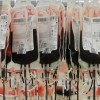Hormones and the Money Markets
Interview with
Meera - In light of the current economic situation, I've come down to the City of London to the trading floor of GFI group. I've come here to find out what underlies the actions taking place here to determine our market. Could human behaviour be playing a vital role in the state of our economy? To help me look into this is John Coates from the Judge Business School at Cambridge University, who's here with me know. Hello, John. How do the markets really work?
John - Essentially what we're doing in markets is buying and selling assets either by private companies or the government. The job of traders is to buy and sell these securities and in deciding whether to buy and sell them they have to make an assessment of the return they're gonna make on these assets over the life of holding them and the risk involved.
Meera - You've been looking into the physiology of traders and the City of London. What have you been looking into?
John - We've been following a hunch I had when I was working on Wall Street during the dot-com bubble. I was struck by the fact that traders at the time were acting very different from the way they were acting before the bubble and after the bubble. They were displaying classic symptoms of mania. They were overconfident. They had racing thought, diminished need for sleep and they were carrying themselves in such an odd way I began to suspect there was a chemical involved. The second thing I noticed was that women were relatively unaffected by the frenzy surrounding the dot-com bubble. During that time I was splitting my time between the trading desk at Rockefeller University on the Upper East side. There I came across a very powerful model that's been tested in a number of different animal species. I thought this model may be applicable to the financial markets. In this model that's called the winner effect two male animals go into a competition. Their testosterone levels rise in preparation for this competition. The winner comes out of this competition with even higher levels of testosterone. The loser comes out with lower levels. The winner may go into the next round of competition with already elevated levels of testosterone. This can give him an added advantage. It has effects on muscles and the cardiovascular system but more importantly it affects his confidence and his appetite for risk. He goes into this competition with a slight edge. It's what happens at the end-game of this model that's really interesting. As the testosterone levels build up in these male animals they become overconfident so, for example, they go out in the open too much. They pick too many fights, they patrol areas that are too large and they neglect parenting duty. They suffer an increased rate of predation. That's exactly what I was observing in traders during the dot-com bubble. They take risks that are, quite frankly, stupid.
Meera - How did you go about actually testing this in City traders?
John - I got access to the floor in the City and we took salivery steroids from a group of traders over a two week period to test that steroids were in fact responding to the money they were making and losing in the market and whether this, in turn, was affecting their trading performance.
Meera - What did you find?
John - We found that the traders, if they had high testosterone in the morning relative the the median levels, they made a lot more money for the rest of the day than they did on the days when they had low testosterone.
Meera - When most people think of testosterone they obviously associate it largely with males. Does this then mean that females are relatively unaffected?
John - Women have about 10% of the testosterone that men do. It's entirely possible that they're not subject to this kind of overconfidence.
Meera - But you're also looking into levels of cortisol, as well.
John - That's right. In the current environment that may be the more interesting steroid. When the market turns around it turns into a crash what can happen is that cortisol, which is a stress hormone, can become elevated in the bodies of traders. Cortisol, if you're exposed to it chronically at high levels for a long period of time, it can have a devastating effect on both the mind and the body. In terms of affecting traders decisions what it can do is affect the memories you recall. You tend to recall bad memories, negative precedents. You tend to see risk where maybe there is none. You become fearful, you feel anxiety. I think that decreases a trader's appetite for risk. While testosterone is causing people to take too much risk cortisol is causing people to take too little risk in the crash.
Meera - What do you think the current situation is now? Do you think there are going to be higher levels or cortisol in the traders at the moment?
John - It's not only how far the market has fallen. It's how long it's been falling. These traders have been under stress for almost a year and a half now. Their cortisol levels must be elevated. I'm sure there's a very good chance it's affecting their decisions.
Meera - You were mentioning that long-term effects of cortisol will have long-lasting effects on their minds. Is this something that companies should think about?
John - I guess so, yeah. It's something the Bank of England should be thinking about. Economics is built on the assumption that economic agents are rational, they respond to price signals. If you increase the price of something by raising interest rates people will stop buying securities. They don't in a bubble. On the flip side during a crash or a depression they lower interest rates and economic agents are supposed to respond to that by buying assets. They look more attractive. If these steroids are reaching such a level in our bodies that we become price-insensitive then monetary policy may no longer work and, in fact, that's what we see.
Meera - Do you think if the banks and the companies understood this physiology a bit more they could work together, say with neuroscientists, to try and get out of the economic situation that we're in at the moment?
John - We're in a bit of a mess at the moment. Cortisol is a hormone that responds not just to loss or injury (loss being in this case money) it also responds more powerfully to situations of novelty, uncertainty and uncontrollability. Within banks I think it's extremely important, although very difficult to create, an environment that minimises the trader's feeling of uncontrollability. Managers think they have to be pro-active as they say in business speak to show that they're doing something to improve the situation. Usually what they're doing is threatening to fire people. That's exactly the wrong thing you should be doing. We need some positive shock to come into the system of the very sort they're talking about now like the bail-out package passed in the US last week and been discussed this week in Britain and Europe to break this downward spiral of risk preferences.










Comments
Add a comment